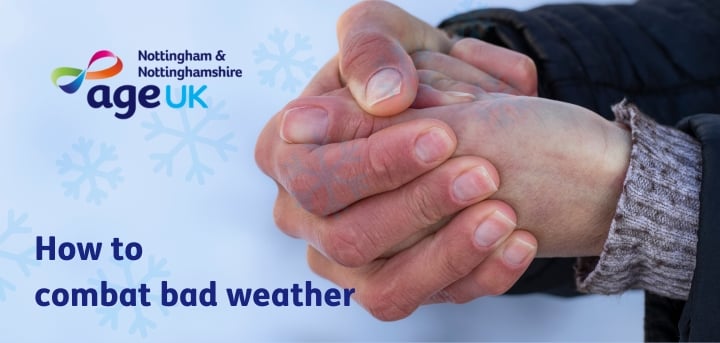How to combat bad weather

Published on 06 February 2024 12:00 PM
Whether it's rain, snow, ice or sleet, winter weather can make it more difficult to get out and about. The good news is there are things you can do to be prepared in case of particularly bad weather.
Keep an eye on the weather forecast
It's a good idea to keep an eye on the weather forecast on a daily basis to help you prepare in case of especially bad weather. You can find out your local forecast by searching for your postcode or area on the Met Office website.
Find out your local forecast on the Met Office website
Make sure you have everything you need
In case bad weather is forecast and it becomes harder to leave the house, make sure you've got enough medication and food. A bottle of water could be handy if the water supply is interrupted, and torches with spare batteries can be helpful in case of a power cut.
Keep emergency numbers nearby
Call 105 in the event of a power cut – you can report a power cut and get information and advice if there's one in your area. You can also register with your supplier's Priority Services Register so they'll call you in the event of a power cut.
Take extra care if the ground is slippery
Wear shoes with good grip and consider keeping salt and sand mixture handy to grit paths. You could ask your neighbours for help to clear paths or driveways in bad weather.
Plan ahead when driving
Try to avoid going out in the car in bad weather if possible, and make sure you follow advice on driving conditions near you. If you do need to go out, pack up the following kit in case you get stuck: blankets, a bottle of water or flask of hot drink, some snacks, a shovel, a de-icer or scraper, a mobile phone and a charger.
Be prepared for a power cut
Power outages can happen for a number of different reasons and, although major power outages are very rare, smaller more localised outages can happen from time to time. They're more common in the winter months, so it’s always good to be prepared.
Stock up on essentials
It’s a good idea to have a torch with spare batteries somewhere in your home and to stock up on some food and drink that doesn’t require any electricity or heat to prepare.
It’s also a good idea to switch off all electrical appliances that aren't designed to run unattended – such as cookers, grills, chip pans, and electric fires – so that they don’t come on without you realising once the power is back.
Think about your health
If you rely on power for your healthcare, you should find out in advance what you need to do if the power does go out. Power cuts will affect equipment such as stair lifts, bath hoists and adjustable beds. By making a plan with your carers now, you'll be better prepared for if things go wrong.
If you rely on medical equipment for a health condition, ensure that your care provider, clinical care team or equipment supplier has supplied you with sufficient information so that you understand how the equipment works and what to do if there's a disruption to your power supply. It's also a good idea to speak to your care team to put a plan in place for what action to take and who you should contact if you experience a power outage.
Sign up to the Priority Services Register
Sign up to the Priority Services Register in advance via your local energy network. Getting on the register means you'll receive extra support and priority updates during a power or gas outage.
Find out more about the Priority Services Register on Ofgem's website
Who should I call if there's a power cut?
In the even of a power cut, call 105 – you can report a power cut and get information and advice if there's one in your area.
